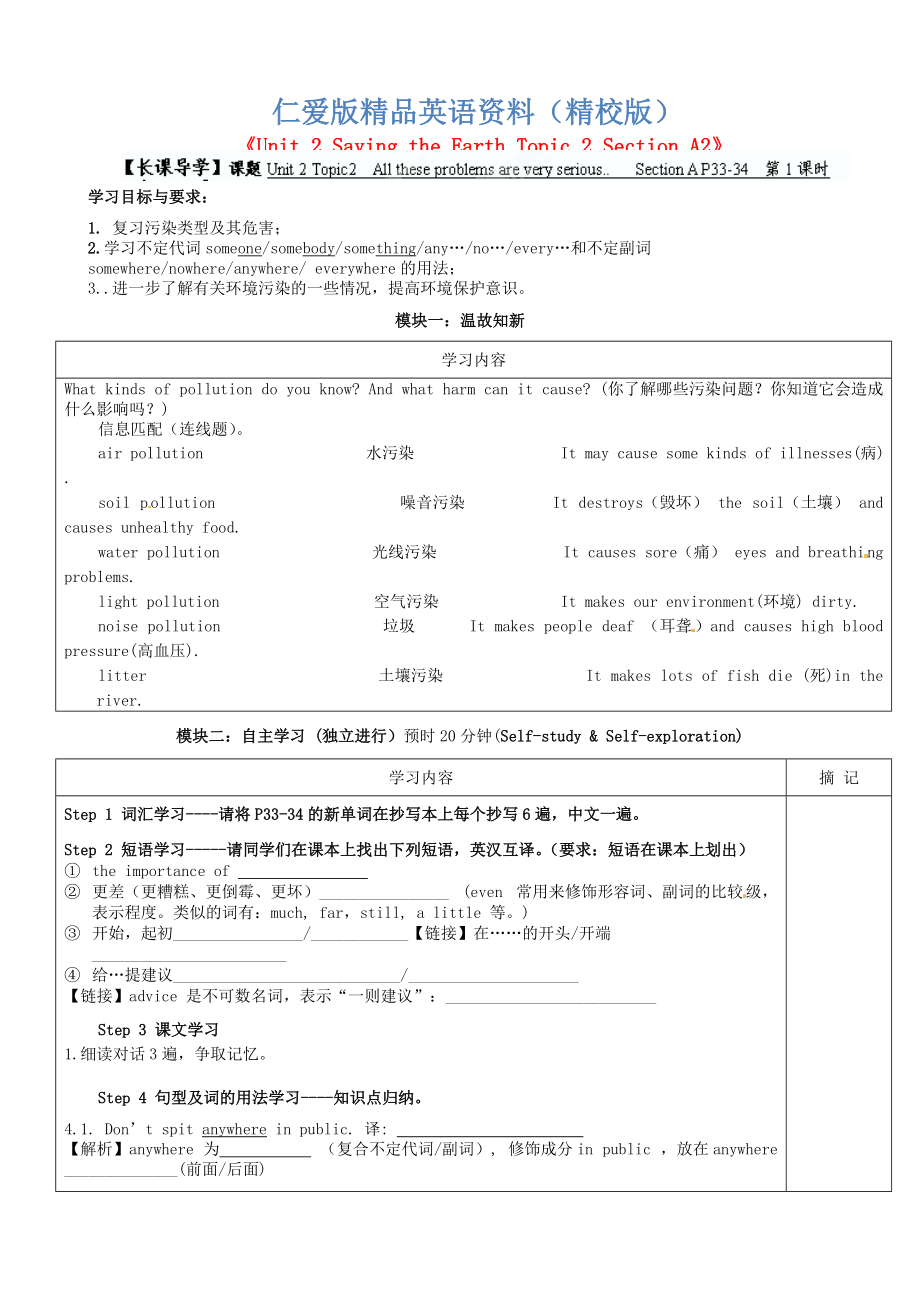《仁愛(ài)版九年級(jí)上冊(cè)Unit 2 Saving the Earth Topic 2 Section A2講學(xué)稿【精校版】》由會(huì)員分享�,可在線(xiàn)閱讀,更多相關(guān)《仁愛(ài)版九年級(jí)上冊(cè)Unit 2 Saving the Earth Topic 2 Section A2講學(xué)稿【精校版】(4頁(yè)珍藏版)》請(qǐng)?jiān)谘b配圖網(wǎng)上搜索�。
1、仁愛(ài)版精品英語(yǔ)資料(精校版)
《Unit 2 Saving the Earth Topic 2 Section A2》
學(xué)習(xí)目標(biāo)與要求:
1. 復(fù)習(xí)污染類(lèi)型及其危害�;
2.學(xué)習(xí)不定代詞someone/somebody/something/any…/no…/every…和不定副詞somewhere/nowhere/anywhere/ everywhere的用法;
3..進(jìn)一步了解有關(guān)環(huán)境污染的一些情況�,提高環(huán)境保護(hù)意識(shí)。
模塊一:溫故知新
學(xué)習(xí)內(nèi)容
What kinds of pollution do you know? And what harm can it cau
2�、se? (你了解哪些污染問(wèn)題?你知道它會(huì)造成什么影響嗎?)
信息匹配(連線(xiàn)題)�。
air pollution 水污染 It may cause some kinds of illnesses(病).
soil pollution 噪音污染 It destroys(毀壞) the soil(土壤) and causes unhealthy food.
water pollution 光線(xiàn)污染 It cau
3、ses sore(痛) eyes and breathing problems.
light pollution 空氣污染 It makes our environment(環(huán)境) dirty.
noise pollution 垃圾 It makes people deaf (耳聾)and causes high blood pressure(高血壓).
litter 土壤污染 It makes lot
4�、s of fish die (死)in the river.
模塊二:自主學(xué)習(xí) (獨(dú)立進(jìn)行)預(yù)時(shí)20分鐘(Self-study & Self-exploration)
學(xué)習(xí)內(nèi)容
摘 記
Step 1 詞匯學(xué)習(xí)----請(qǐng)將P33-34的新單詞在抄寫(xiě)本上每個(gè)抄寫(xiě)6遍,中文一遍�。
Step 2 短語(yǔ)學(xué)習(xí)-----請(qǐng)同學(xué)們?cè)谡n本上找出下列短語(yǔ),英漢互譯�。(要求:短語(yǔ)在課本上劃出)
① the importance of
② 更差(更糟糕、更倒霉�、更壞)________________ (even 常用來(lái)修飾形容詞、副詞的比較級(jí)�,表示程度。類(lèi)似的詞有:
5�、much, far�,still, a little 等。)
③ 開(kāi)始�,起初________________/____________【鏈接】在……的開(kāi)頭/開(kāi)端________________________
④ 給…提建議____________________________/_____________________
【鏈接】advice 是不可數(shù)名詞,表示“一則建議”:__________________________
Step 3 課文學(xué)習(xí)
1.細(xì)讀對(duì)話(huà)3遍�,爭(zhēng)取記憶。
Step 4 句型及詞的用法學(xué)習(xí)----知識(shí)點(diǎn)歸納�。
4.1. Don’t spit
6、anywhere in public. 譯:
【解析】anywhere 為 (復(fù)合不定代詞/副詞), 修飾成分in public �,放在anywhere ______________(前面/后面)
4.2. 總結(jié)歸納復(fù)合不定代詞、副詞的用法:
①一般情況下用于肯定句有: 復(fù)合不定代詞:someone somewhere(副詞)
②一般情況下用于否定句和疑問(wèn)句:anyone
7�、
③表否定含義:none
④可用于各種句式:everyone
⑤不定代詞作主語(yǔ)時(shí)謂語(yǔ)動(dòng)詞要用____________(單數(shù)、復(fù)數(shù));
⑥Everyone is here, aren’t they? 大家都在這兒�,是嗎?
Everything goes well, doesn’t it?一切都順利�,是嗎?
在反意疑問(wèn)句中�,表示人的不定代詞作主語(yǔ)時(shí),其反意疑問(wèn)句的主語(yǔ)通常用代詞________�;
當(dāng)句子中的主語(yǔ)是指物的不定代詞時(shí),其反意疑問(wèn)句主語(yǔ)
8�、通常是代詞________;
小組內(nèi)成員互查完成情況并給予等級(jí)評(píng)定: ☆
模塊三:交流研討 (小組交流�、合作、展示)預(yù)時(shí)35分鐘 (Cooperation �,Exploration &Show)
研討內(nèi)容
摘 記
Step 5 聽(tīng)讀(10’) 1.播放P33-1a的對(duì)話(huà),學(xué)生跟讀1-2遍�。
2.聽(tīng)力訓(xùn)練:P34-3 Work alone . In the past, people killed animals for their meat and skins. Now some kinds of animals are becoming fewer
9、and fewer. And some animals are in danger of dying out completely. Now humans have come to realize the importance of protecting animals. What should I do ? 1)聽(tīng)3錄音�,完成3中A。2)認(rèn)真理解3中B的句子�,再聽(tīng)錄音,完成3中B�,并核對(duì)答案。
Step 6合作 大組長(zhǎng)組織�,組員共同探討下面研討內(nèi)容,并形成統(tǒng)一的組內(nèi)意見(jiàn)�;
【研討內(nèi)容】 討論一:核對(duì)模塊二Step 2 歸納本課時(shí)的重點(diǎn)短語(yǔ)或句型。
討論二:核對(duì)模塊二 St
10、ep 3課文學(xué)習(xí)-----朗讀訓(xùn)練
討論三:核對(duì)模塊二 Step 4句型及詞的用法學(xué)習(xí)----知識(shí)點(diǎn)歸納�。
Step 7 展示 【大組展示方案】
展示任務(wù)一:討論一:模塊二Step 2 歸納本課時(shí)的重點(diǎn)短語(yǔ)或句型。
建議:將本組答案在白板上展示�,并帶讀其他同學(xué)的學(xué)習(xí)氣氛。
課堂評(píng)價(jià)要素:
1�、 合理評(píng)價(jià)組員,全員參與�,有序展示;
2�、 書(shū)寫(xiě)規(guī)范,工整美觀(guān)�,雙色筆運(yùn)用得當(dāng);
3�、 發(fā)音清晰,聲音洪亮�;
4、 面向全體�,自然大方�,肢體語(yǔ)言運(yùn)用得當(dāng);
展示生動(dòng)活潑�,獨(dú)具特色。
模塊四:教師精講(預(yù)時(shí)7分鐘�,認(rèn)真聽(tīng)講并記錄要點(diǎn))
訓(xùn)練內(nèi)容
摘 記
11、1�、不定代詞及不定副詞的主要用法。(作主語(yǔ)時(shí)、被形容詞修飾時(shí)�、用于反意疑問(wèn)句時(shí));
2�、We should do everything we can to protect the environment. 此句中動(dòng)詞不定式作目的狀語(yǔ)的用法;
( ) Our teacher did what he could _______ us with English.
A. help B. helped C. helping D. to help
教學(xué)反思:________________________________________________________
12�、_____________
模塊五:當(dāng)堂訓(xùn)練(預(yù)時(shí)20分鐘)
一.能幫助方框中的單詞找到家嗎?
die out, rude, behavior, importance, in the beginning
1. Drawing on the wall is a kind of bad ________. Don’t do it again.
2. This kind of disease has completely __________ in the country because of the doctors’ hard work.
13�、
3. Everyone knows the _________ of protecting the environment.
4. It’s difficult for us to remember so many new words _________, but it will become better.
5. You should be polite to the foreigners. Don’t be __________ to them.
二. 根據(jù)首字母提示完成短文。
Many years ago, there was a man called John. H
14�、e l 1 in a small house on a hill. There were some big trees a 2 his house. One day he thought, “ If I cut all these trees down, I can b 3 a new house.” And the next day, he did s 4 .
A few days l 5 , a nicer and bigger house was built. But one evening after he built
15、his new house, there came a strong w 6 , which blew his new house over. John didn’t know w 7 . He said to h 8 , “Before I cut down the trees, I h 9 a small house to live in. But now a new house means n 10 house to me.”
1._____________ 2.______________ 3.______________ 4._____
16�、__________ 5._________________
6.____________ 7._____________ 8.______________ 9.______________ 10.________________
【學(xué)生自主反思】(寫(xiě)出今日一得和今日不足)
今日一得
今日不足 ___
 仁愛(ài)版九年級(jí)上冊(cè)Unit 2 Saving the Earth Topic 2 Section A2講學(xué)稿【精校版】
仁愛(ài)版九年級(jí)上冊(cè)Unit 2 Saving the Earth Topic 2 Section A2講學(xué)稿【精校版】

